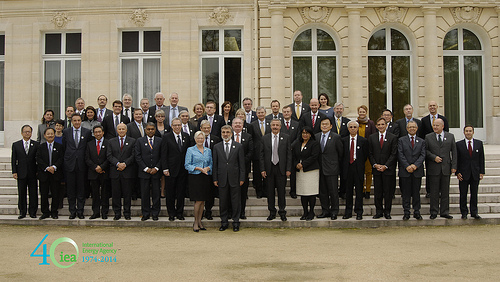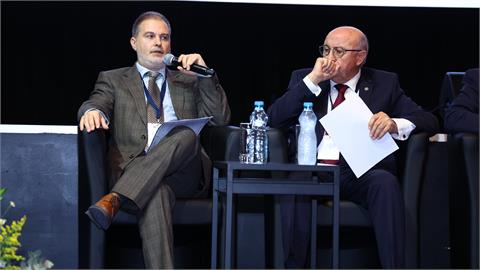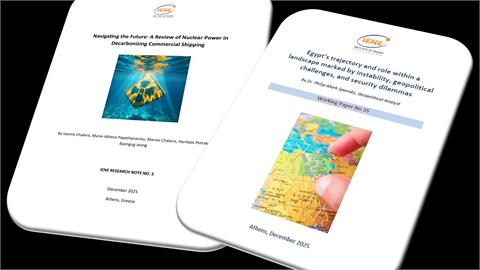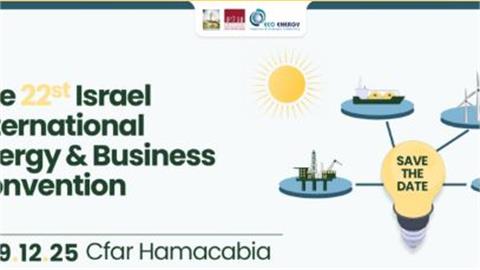Following an invitation by Greece’s Minister of Environment, Energy and Climate Change Mr. Yannis Maniatis, IENE’s Executive Director Mr. Costis Stambolis, joined the Greek delegation as an advisor at the recent IEA Ministerial 2013 conference held in Paris on November 19-20. Costis Stambolis assisted the Greek team with background research and expert analysis on a variety of issues which were discussed during this two day intensive top level gathering which was held at OECD headquarters in Paris
Following an invitation by Greece’s Minister of Environment, Energy and Climate Change Mr. Yannis Maniatis, IENE’s Executive Director Mr. Costis Stambolis, joined the Greek delegation as an advisor at the recent IEA Ministerial 2013 conference held in Paris on November 19-20. Costis Stambolis assisted the Greek team with background research and expert analysis on a variety of issues which were discussed during this two day intensive top level gathering which was held at OECD headquarters in Paris.
The Greek delegation headed by Minister Yannis Maniatis, included ProfessorGeorge Prevelakis ambassador to Greece’s permanent delegation at OECD, Mr. Nikolaos Papachristos, Deputy Head of the permanent delegation, Ms. Alexandra Sdoukou, the Ministry’s legal advisor and head of the Minister’s office and Ms. Vanessa Manavi, first secretary at Greece’s OECD delegation.
Minister Yannis Maniatis focused his intervention at the IEA Ministerial on certain key areas which were of direct relevance to Greece but also related to the broader issue of European energy supply. As Minister Miniatis aptly observed "Rising oil and gas production outside OPEC is inevitable in a sense. It is a new reality as the current trend shows and which in our view will become even more, profound as new hydrocarbon production areas emerge throughout the world even in Europe. Take SE Europe as an example and the East Mediterranean in particular whose production prospects have been revised manyfold over the last five or six years and currently stand at 40 tcf, a figure which most likely will increase even further. In terms of natural gas potential this is equivalent to that of Azerbaijan. So in a way the East Med, i.e. Israel, Cyprus, Greece, today presents a new paradigm shift as it promises to become a major oil and gas producing area outside OPEC, yet within the vicinity of the Arab world. This in our view is part of what we termed as new reality which will also have important implications on global energy flows and oil security.
As far as SE Europe is concerned significant oil and gas production in the East Med will strengthen the importance of the South Gas corridor, as a major energy supply route to Europe. Already this new gas corridor, the fourth in European terms, is on its way of being implemented through the TANAP-TAP pipeline system, construction of which will start next year. East Med, gas to be transported both through pipeline and LNG, will come to augment available gas quantities. Such a positive development can only strengthen European energy security. However, for this to happen regional co-operation and understanding will need to improve so that all countries in the area can benefit by delivering the new oil and gas volumes which we know that they hold.”
Another important area which Minister Maniatis referred to was that of energy efficiency, a key issue at IEA’s Ministerial. Developing successful energy efficiency policies and implementing effective energy efficiency measuresMinister Maniatis pointed out, is a real challenge, far more difficult as our experience of several years shows. It is I believe more a question of culture and sheer determination from the part of both the state and the consumer. In our view, and based on the lessons derived over the last three years, where for the first time we introduced effective energy efficiency policies in Greece’s building sector. There are three important considerations involved:
(i)A well thought out plan addressed to the average householder, where simplicity in terms of components and ease of involvement, from the part of the householder, is of paramount importance.
(ii)Funding should be in place and financial assistance, based on easy to understand and transparent rules, should be managed only by one entity. In our case, Banks.
(iii)Energy prices must reflect market conditions and therefore not subsidized in any way or form, so that the householder has every incentives to want to make his or her household more energy efficient.




